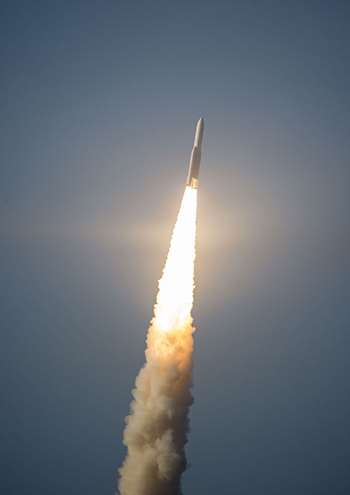The first of two NBN satellites has been successfully launched into space from French Guiana.
The Sky Muster satellite blasted off at 6.30am Sydney time on Thursday October 1. It weighs 6440kg at launch and is expected to operate for 15 years.
A second satellite is scheduled to launch “early next year”, with NBN services to begin operating “in the first half of 2016”, Communications Minister Senator Mitch Fifield said.
“The NBN long term satellite service will be a game changer for many remote Australians, offering broadband services at ADSL2 comparable speeds for the first time,” Fifield said.
About 400,000 homes and businesses will ultimately be serviced by the NBN satellites.
Sky Muster is headed for an orbital slot about 36,000 kilometres above Australia. Once in place, it – and its sister satellite – will project 101 spot beams “providing coverage to Australia and to five offshore locations: Christmas, Cocos, Lord Howe, Norfolk and Macquarie Islands”, Fifield said.
It has already been sighted by satellite tracking stations in Western Australia and elsewhere, according to tweets.
SSL confirm that #skymuster has been sighted by WA groundstation. Successful launch, separation & sighting @NBN_Australia @FixBushInternet
— Kylie Lindsay (@KylieMLindsay) September 30, 2015
First signal received from Hassan, India and now Dongara in WA. We're flying people! #nbn #satellite #SkyMuster pic.twitter.com/qhU4StJI7c
— karina keisler (@karinakeisler) September 30, 2015
The satellite launch was the culmination of work by NBN, Arianespace, Space Systems Loral (SSL), ViaSat, Optus and Ericsson.
“A huge amount of work has gone into this moment, and thousands of people across the world have worked tirelessly to make this launch successful,” NBN chairman Dr. Ziggy Switkowski said in post-launch comments at French Guiana.
“It’s a significant moment for all of us Australians and truly a historic moment for our country.”
<iframe src="https://www.youtube.com/embed/sJSP0jPT7b8" style="width: 934px; height: 748px;"></iframe>
The successful launch was welcomed by the telecommunications industry, including by the Australian Communications Consumer Action Network (ACCAN).
“People increasingly need a reliable and affordable internet connection for essential services, such as education, banking and health,” ACCAN CEO Teresa Corbin said.
“When these services become available to consumers in the first half of 2016, ACCAN hopes they will meet consumer need and be sold at a comparable cost to services sold in the rest of Australia.”
SSL – which built the satellite – tweeted its congratulations on the successful launch.
SSL sends thanks and congrats to @nbn_Australia & @Arianespace on the successful launch of its 100th 1300 #satellite https://t.co/wVMRDTux99
— SSL (@sslmda) September 30, 2015
While the Government trumpeted the successful launch of Sky Muster, it has not always been behind the strategy taken by the former Labor Government to build and deploy its own satellites.
When in opposition, Malcolm Turnbull described Sky Muster and its sister satellite as a "Rolls-Royce" communications system.
He instead advocated use of satellite capacity from the private sector, or an upgrade to the interim satellite service leased by NBN to make it a "permanent" one.









